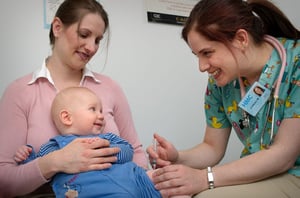 Parents and child care providers agree that feeding and sleep schedules are important to help keep their children healthy. The same goes for childhood immunizations. Vaccinating children on time is the best way to protect them from 14 serious and potentially deadly diseases before their second birthday, and it’s a shared responsibility.
Parents and child care providers agree that feeding and sleep schedules are important to help keep their children healthy. The same goes for childhood immunizations. Vaccinating children on time is the best way to protect them from 14 serious and potentially deadly diseases before their second birthday, and it’s a shared responsibility.
“The recommended immunization schedule is designed to offer protection early in life,” said Dr. Candice Robinson, a pediatrician at the Centers for Disease Control and Prevention (CDC), “when babies are vulnerable and before it’s likely they will be exposed to diseases.”
Public health and medical experts base their vaccine recommendations on many factors. They study information about diseases and vaccines very carefully to decide which vaccines kids should get and when they should get them for best protection.
Although the number of vaccines a child needs in the first two years of life may seem like a lot, doctors know a great deal about the human immune system, and they know that a healthy baby’s immune system can handle getting all vaccines when they are recommended.
Parents who are concerned about the number of shots given at one time can reduce the number given at a visit by using the flexibility built into the recommended immunization schedule. For example, the third dose of hepatitis B vaccine can be given at 6 through 18 months of age. Parents can work with their child’s healthcare professional to have their child get this dose at any time during that age range.
“I make sure my kids are vaccinated on time,” said Dr. Amanda Cohn, a pediatrician at CDC. “Getting children all the vaccines they need by age 2 is one of the best things parents can do to help keep their children safe and healthy.”
If you have questions about the childhood immunization schedule, talk with your child’s doctor or nurse.
Additional resources:
- Previous CCAoA blog post, Resources for National Infant Immunization Week
- CDC vaccines and immunizations
- Vaccines.gov






